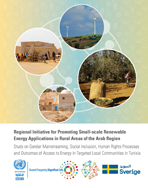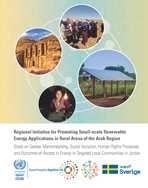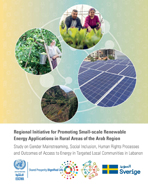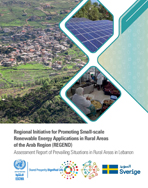Regional Initiative to Promote Small–Scale Renewable Energy Applications in Rural Areas of the Arab Region “REGEND”
Background
The Arab region is endowed by natural resources, namely abundant fossil fuels and renewables like wind, solar… and aridity with most of its land covered by desert. However, the rising urbanization and unequal access to energy and basic services such as education, healthcare, water resources, and decent jobs is affecting a significant portion of the rural population. Water, energy and food security, growing manifestation of Climate Change represent major challenges for its sustainable development.
Rural communities continue to depend on traditional energy resources which are inadequate to support the expansion of agricultural value chains, the extension of basic services and improvements in the quality of life of women, children and vulnerable groups who dominate the Arab rural population. In addition, the rising economic expectations by the region’s young, and increasingly educated populations necessitate better governance and sustainable management of the natural assets Other challenges include the limited knowledge and awareness of policy makers on policy tools to incentivize the dissemination and use of appropriate small scale Renewable Energy technologies in rural communities. In fact, Arab governments are more focused on the development of large scale RE power generation systems. This leads to a lack of the enabling environment and financial support for the private sector to invest in small scale RE technologies, especially in rural areas which hinders the development and investment in such projects.
The Regional Initiative for Promoting Small-Scale Renewable Energy Applications in rural areas of the Arab Region (REGEND) aims at impacting rural communities to benefit from RE applications to help meet their needs. The development of appropriate Renewable Energy (RE) applications will open up more entrepreneurial opportunities in productive sectors, beyond agriculture, will ease the pressure of migration to urban areas, and contribute to reducing the social strife, gender disparity, potential rise of conflict and build resilience to climate change.
Key Partners
The Regional Initiative for Promoting Small-Scale Renewable Energy Applications in rural areas of the Arab Region (REGEND) is a Sida funded project. Partners in implementation include League of Arab States (LAS), line ministries, local authorities, various regional organizations and Arab Women associations, UN organisations, local and regional NGOs, Research institutions and Academia.
- Project Long term Objective: The project aims to improve the livelihood, economic benefits, social inclusion and gender equality of Arab rural communities particularly marginalized groups, by addressing energy poverty, water scarcity and vulnerability to climate change and other natural resources challenges. This will be pursued through using appropriate small-scale renewable energy technologies for productive activities and entrepreneurial development, women empowerment with emphasis on job creation and developing robust value chains in a nexus approach to encourage a sustainable economy. Finally, the project will support the needs to move away from a model based on “handouts” to a model based on “knowhow” in order to ensure a promising way forward of the Arab region.
- Target Beneficiaries: The Project intends to adopt a multi stakeholder approach where:
- Primary beneficiaries would be the rural population with emphasis on marginalised and vulnerable groups
- Second category of beneficiaries includes Governmental relevant ministries and Agencies (Energy, Economic Development, Industry, Agriculture, Planning, and Social Affairs), local government bodies, civil societies, relevant NGOs and women associations. Additional stakeholders are expected to join the Project during its implementation such as small and medium enterprises (SMEs) or similar type of private sector, financial institutions and Academic Research Institutions and Universities.
Methodology
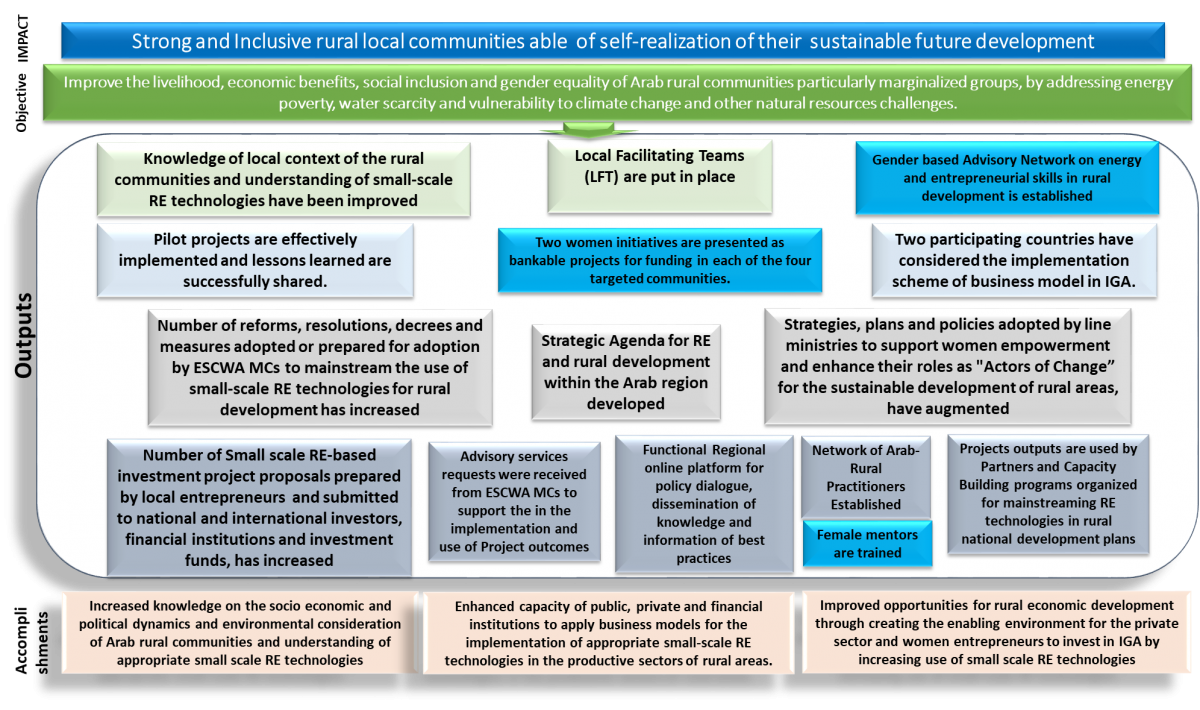
Outputs
- Output 1.1: Baseline Study of socio economic and political dynamics and environmental consideration linked to productive activities by sector, access to energy services requirements and availability of sources of energy supply, and associated technologies needed to support resilience in rural community.
- Output 1.2: Country Gender Assessment on entry-points to energy access, entrepreneurial development, and building resilience to climate change of the targeted communities of the Arab rural areas.
- Output 1.3: Toolkits, Fact Sheets/Booklets and other promotional material on appropriate Small Scale RE technologies and applications.
- Output 2.1: Conceptual Comprehensive Business models for implementation of small-scale RE technologies in support of resilience of the targeted population, developed, tested and disseminated.
- Output 2.2: Pilot projects implemented in selected local communities of the rural area of targeted Arab countries to test and fine-tune the Comprehensive Conceptual Business models.
- Output 3.1: Policy Toolkit as Regional Strategic guidelines to improve the enabling environment for the private sector and women entrepreneurs to invest in income generating activities by increasing use of small-scale RE technologies in productive activities in the Arab rural areas.
- Output 4.1: A Regional Entity established to adopt the developed policy frameworks and implementation tools and support a sustainable and durable operationalisation of the developed models and policy tools beyond the pilot phase of the initiative.
- Output 4.2. Training of the Trainers (ToT) and establishment of a Network of Arab-Rural Practitioners to build long-term ownership of the project and to ensure successful achievement of its intended results.
- Output 4.3.: Multi-Stakeholder Forum (MSF) on Small Scale RE technology use for entrepreneurial development and gender mainstreaming in productive sector within the rural area of the Arab Countries.
- Output 4.4.: Dissemination of Information and Knowledge of the Project Outputs






